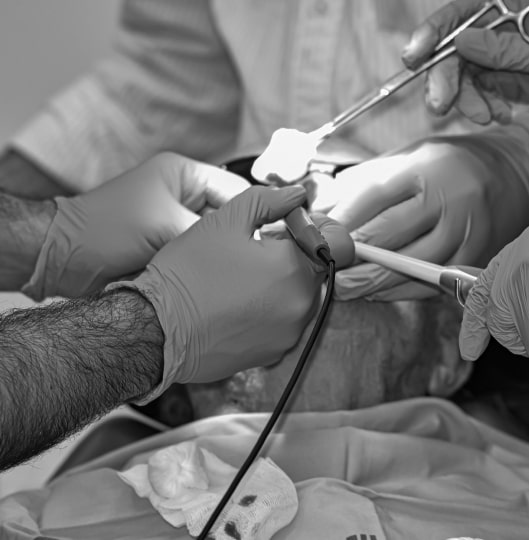Save Your Damaged Tooth in a Variety of Situations
Our endodontist will be happy to discuss the specific type of surgery your tooth requires.
Endodontic Surgery In Chicago
Have a damaged or painful tooth? In most cases, a root canal is performed to save teeth with injured pulp from extraction. Sometimes, this non-surgical procedure is not sufficient to heal the tooth and the endodontist recommends endodontic surgery.
Endodontic surgery is a dental procedure that is performed to preserve the natural tooth affected by apical periodontitis that cannot be treated with conventional root canal therapy, or to fix issues concerning root canal procedures. Endodontic surgeries in Chicago are performed by an expert and experienced endodontic surgeon at The Dental Specialists to treat the damaged tissues outside of the tooth root when it becomes inflamed or infected and causes great discomfort.
Causes/Indications
Endodontic surgery is performed when there is-
- Requirement for surgical drainage of the severely infected tooth pulp to preserve the natural tooth
- Failure of non-surgical root canal treatment (including irretrievable root canal filling or intraradicular post)
- Need to treat calcific metamorphosis of the pulp stone (i.e. remove the calcium deposits in the root canal), damaged root surfaces, or the damaged surrounding bone of the tooth
- Error in the procedures like non-negotiable ledging, root perforation, instrument fragmentation, and symptomatic overfilling
- Anatomic variations of the tooth roots such as root dilacerations and apical root fenestrations
- Need of a biopsy from the periapical region
- Need to retrieve broken instruments
- Requirement of replacement surgery or corrective surgery for root caries, root resorptive defects, root-end resection (apicoectomy for infection or inflammation of the bony area near the tooth roots after root canal treatment), bicuspidization, and hemisection
- Need to examine the tooth roots. If the patient experiences persistent toothache and nothing can be revealed by dental X-rays, the surgery can be used during the initial treatment to locate the hidden canals or tiny tooth fractures and provide treatment.

Pre-requisites
- Adults are recommended to take the necessary medications to minimize swelling, soreness, or any other discomfort during the surgery. Systemic non-steroidal anti-inflammatory drug therapy must be considered prior to the surgery to reduce post-operative pain.
- Take antibiotics as instructed by the physician before the surgery.
Surgical Procedure
The endodontic surgeon at TDS first makes the patient comfortable by numbing the surgical site with local anesthesia. Many different endodontic surgical procedures can be performed among which the most common one is apicoectomy. The surgery starts with a gum incision near the infected tooth to get access to the underlying bone. Through the open gum tissues, the surgeon removes inflamed or infected tissues lying at the root end along with the removal of the very end of the root. The end of the root canal is then sealed with a small filling. At this step, the root structure is also closely examined for cracks and splits. Gum tissues are repositioned in their place and stitched together to help them heal. If required, gum dressings are applied on the wounded site.
In the case where the patient’s anatomy makes it difficult to reach the infected tooth, intentional replantation surgery may be performed. This involves extraction of the damaged tooth, its outside treatment, and its replacement in the original tooth socket.
What to Expect After the Surgery?
Following endodontic surgery, it is normal to expect some discomfort and seldom occurrence of severe pain. During the first day, slight bleeding is there along with some swelling which increases for the first 2-3 days and then subsides and discoloration. Moreover, there is a temporary loss of sensation in the operated area and the tooth may feel loose initially. Most people resume their normal daily routine the next day.

Post-operative Instructions
- In the initial 24 hours following the surgery, gently rinse the mouth with warm water containing ½ teaspoon of salt. This must be carried out daily after every meal and before bed and continued until the sutures are removed and healing is over. A prescribed mouthwash may even be used when necessary.
- Carefully brush around the surgical site leaving alone the gumline on the area of suture placement. Maintain oral hygiene.
- Avoid pulling or lifting of the lip as it may lead to tearing of sutures and delay healing.
- Apply the provided cold compresses or ice packs over the operated site for a few minutes every half an hour until bedtime. This is extremely helpful practice over the first 24 hours post-operation to minimize the gums swelling and tooth discoloration.
- Take proper rest on the remaining day of the surgery. While resting or sleeping, keep the head elevated with two pillows to help reduce localized swelling.
- Do not consume alcohol or smoke/chew tobacco for at least 24 hours.
- Have a properly nutritious diet that does not require vigorous chewing to encourage rapid healing.
Our oral surgery practice has professionally trained surgical assistants and expert oral surgeons in Chicago who can treat painful and damaged teeth with endodontic surgery.
To find out if endodontic surgery would benefit you, book an appointment with us!
